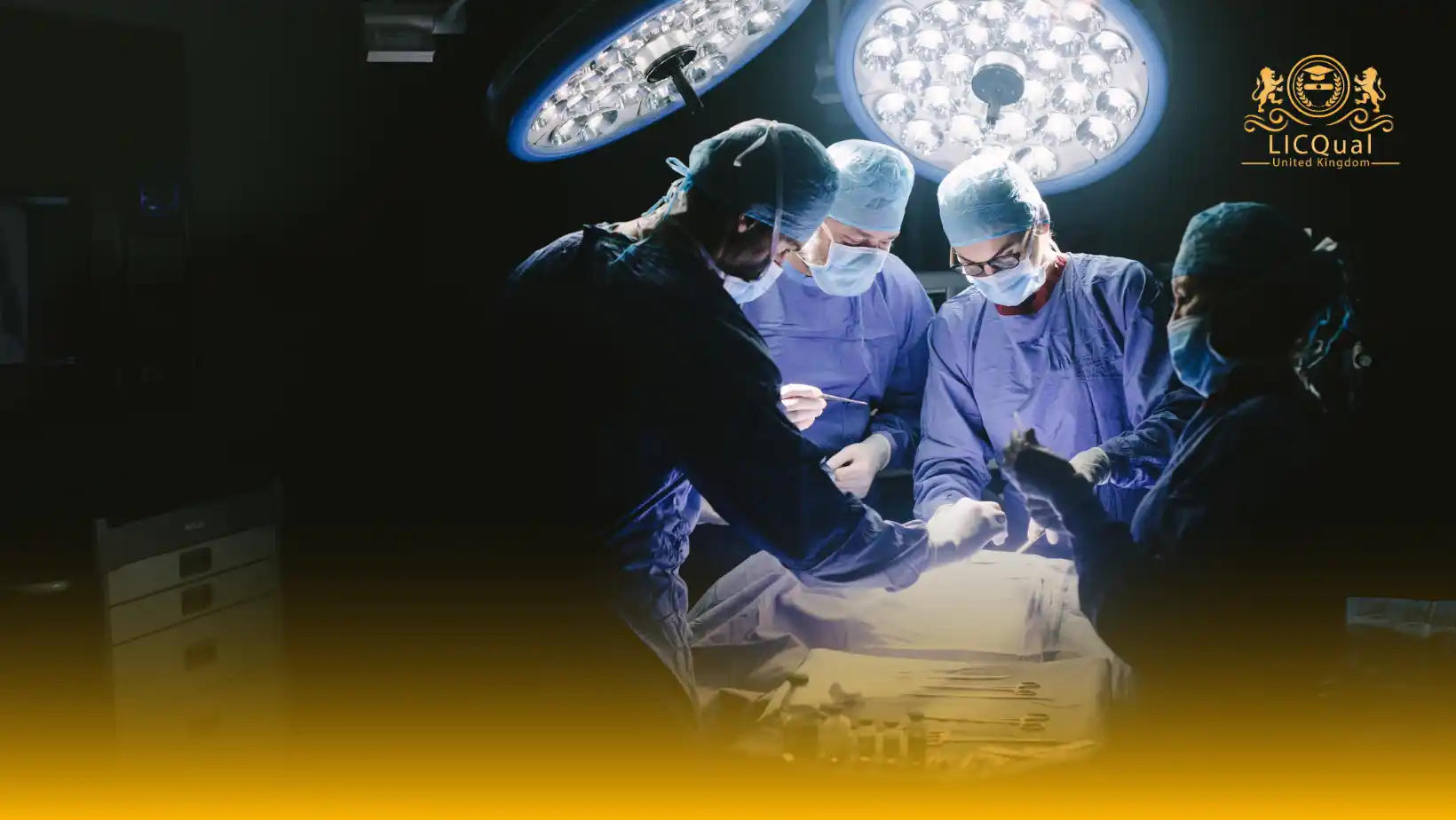The LICQual Level 3 Certificate in Oral and Maxillofacial Surgery is a rigorous and highly specialised qualification tailored for established dental and surgical professionals seeking to expand their clinical capabilities, elevate their career trajectory, and enrich their Continuing Professional Development (CPD). This programme is not intended for fresh entrants, but rather for practitioners who already possess a solid foundation in dental or surgical care and aspire to advance into the domain of oral and maxillofacial surgery.
Designed to foster advanced, evidence-based practice, this certificate offers targeted instruction in surgical principles, clinical decision-making, and patient-centred care. Learners will engage with in-depth theoretical knowledge and practical skills essential for managing complex maxillofacial conditions and procedures, contributing to both professional competence and confidence.
Centres authorised to deliver this qualification are required to uphold exacting standards of excellence. They must employ competent and qualified staff, with verified expertise in oral and maxillofacial surgery and a commitment to educational quality. Moreover, centres must be equipped with comprehensive learning materials, specialised surgical instrumentation, and simulation resources, alongside a supportive clinical learning environment that ensures learner success and safety.
By enrolling in this qualification, professionals demonstrate a dedication to maintaining surgical excellence, advancing their clinical proficiency, and contributing to high standards of patient care—through structured, accredited CPD tailored to the demanding field of oral and maxillofacial surgery.
Course Overview
Qualification Title
LICQual Level 3 Certificate in Oral and Maxillofacial Surgery
Total Units
6
Total Credits
24
GLH
120
Qualification #
LICQ2200635
Qualification Specification
To enroll in the LICQual Level 3 Certificate in Oral and Maxillofacial Surgery , applicants must meet the following criteria:
|
Qualification# |
Unit Title |
Credits |
GLH |
|---|---|---|---|
|
LICQ2200635-1 |
Surgical Basic Sciences & Patient Care |
4 |
20 |
|
LICQ2200635-2 |
Reflective Oral Surgery Practice |
4 |
20 |
|
LICQ2200635-3 |
Dental Tissues & Implantology |
4 |
20 |
|
LICQ2200635-4 |
Bone: Disease, Sinus, Trauma |
4 |
20 |
|
LICQ2200635-5 |
Soft Tissue and Neoplastic Conditions |
4 |
20 |
|
LICQ2200635-6 |
Salivary Glands, Facial Pain & TMJ |
4 |
20 |
By the end of this course, learners will be able to:
Unit 1: Surgical Basic Sciences & Patient Care
By the end of this unit, the learner will be able to:
- Demonstrate a comprehensive understanding of core surgical sciences relevant to oral and maxillofacial surgery.
- Conduct safe and effective preoperative assessments for surgical patients.
- Apply appropriate postoperative care principles to optimise patient recovery.
- Implement effective pain management and anxiety control strategies.
- Adhere to clinical safety protocols and best practices in surgical environments.
Unit 2: Reflective Oral Surgery Practice
By the end of this unit, the learner will be able to:
- Apply reflective practice techniques to improve surgical decision-making and outcomes.
- Recognise and apply ethical considerations in oral and maxillofacial surgical procedures.
- Critically evaluate personal clinical performance and identify areas for improvement.
- Integrate evidence-based research into surgical practice for enhanced patient care.
Unit 3: Dental Tissues – Infections, Inflammation & Implantology
By the end of this unit, the learner will be able to:
- Diagnose and manage common and complex infections affecting dental tissues.
- Identify and treat inflammatory conditions of the oral cavity and jaw.
- Perform surgical extractions and related oral surgical interventions.
- Demonstrate knowledge and practical understanding of implantology principles.
- Manage peri-implant diseases and ensure long-term implant success.
Unit 4: Bone, Disease & Injury Management
By the end of this unit, the learner will be able to:
- Diagnose and manage osseous pathology within the maxillofacial region.
- Apply effective treatment protocols for maxillary sinus diseases.
- Assess and manage injuries to facial bones and related structures.
- Implement appropriate surgical and non-surgical trauma management techniques.
Unit 5: Soft Tissue Pathology & Neoplastic Conditions
By the end of this unit, the learner will be able to:
- Identify and surgically manage oral and facial soft tissue cysts.
- Diagnose and treat mucosal diseases affecting the oral cavity.
- Recognise and manage premalignant lesions with evidence-based protocols.
- Apply surgical and clinical interventions for malignant oral conditions.
Unit 6: Salivary Tissue, Facial Pain & TMJ Disorders
By the end of this unit, the learner will be able to:
- Diagnose and manage disorders affecting the salivary glands.
- Assess and treat various types of facial pain syndromes.
- Implement effective interventions for temporomandibular joint (TMJ) disorders.
- Integrate multidisciplinary approaches for complex orofacial pain management.
The LICQual Level 3 Certificate in Oral and Maxillofacial Surgery is ideal for dental professionals who want to specialize in oral surgery and enhance their clinical expertise. This course is suitable for dental nurses, dental assistants, and aspiring oral surgery practitioners seeking accredited recognition and practical skills. Whether you work in private dental practices, surgical clinics, or hospital departments, this qualification equips you with the knowledge and confidence to deliver safe and effective surgical support.
1. Dental Nurses Seeking Specialization
- Ideal for dental nurses aiming to expand their skills into oral surgery.
- Develops practical knowledge in assisting surgical procedures.
- Enhances understanding of surgical instruments and protocols.
- Builds confidence in patient care during pre- and post-operative stages.
- Adds an accredited Level 3 certification to career credentials.
2. Dental Assistants Looking for Career Growth
- Perfect for dental assistants wanting specialized surgical knowledge.
- Strengthens ability to support surgical teams effectively.
- Improves patient management and care skills during procedures.
- Enhances knowledge of oral and maxillofacial anatomy.
- Provides recognized certification to boost professional opportunities.
3. Aspiring Oral Surgery Practitioners
- Designed for professionals entering oral and maxillofacial surgery.
- Provides foundational and advanced surgical skills.
- Develops competency in patient preparation and monitoring.
- Prepares learners to assist or perform minor surgical procedures confidently.
- Recognized qualification for career progression in surgical dentistry.
4. Experienced Dental Professionals
- Suitable for dentists or hygienists seeking to upskill in oral surgery.
- Enhances technical expertise in surgical procedures.
- Supports professional development and specialization.
- Provides insights into modern surgical techniques and clinical best practices.
- Strengthens ability to supervise junior staff during procedures.
5. Private Practice and Clinic Staff
- Ideal for staff working in private dental or surgical clinics.
- Improves competency in assisting with oral and maxillofacial procedures.
- Enhances patient care and clinical workflow efficiency.
- Ensures compliance with safety and professional standards.
- Adds a professional, accredited certification to the team.
6. Healthcare Professionals in Hospitals or Surgical Departments
- Tailored for dental teams in hospital or clinical settings.
- Provides skills to support surgical programs effectively.
- Enhances understanding of patient care and monitoring.
- Develops confidence in assisting with complex procedures.
- Recognized certification for career development in healthcare.
7. Students and Career Changers Entering Dentistry
- Perfect for individuals transitioning into dental or surgical roles.
- Provides structured learning in surgical theory and practical application.
- Builds hands-on skills for clinical use.
- Increases employability in dental and oral surgery settings.
- Globally recognized Level 3 certification for professional growth.
The LICQual Level 3 Certificate in Oral and Maxillofacial Surgery prepares dental professionals across various roles to deliver safe, high-quality surgical support while advancing their careers.
Training centres delivering the LICQual Level 3 Certificate in Oral and Maxillofacial Surgery must meet the following requirements to ensure high-quality training, learner success, and compliance with international standards:
- Qualified and Competent Staff – All trainers and assessors must hold relevant professional qualifications, clinical experience, and up-to-date industry knowledge in oral and maxillofacial surgery.
- Adequate Training Facilities – Centres must provide a safe, fully equipped learning environment, including access to surgical models, dental chairs, sterilisation units, and appropriate clinical instruments.
- Access to Learning Resources – Learners should have access to up-to-date study materials, textbooks, digital resources, and research databases to support their studies.
- Robust Assessment Systems – Centres must implement fair, transparent, and consistent assessment procedures aligned with LICQual standards.
- Compliance with Health and Safety Regulations – All practical training areas must meet current safety guidelines to protect learners, staff, and patients.
- Learner Support Services – Centres must provide academic guidance, pastoral support, and clear communication channels for all learners.
- Commitment to CPD for Staff – All teaching and assessing staff must engage in ongoing Continuing Professional Development to maintain industry relevance and teaching excellence.
- Monitoring and Quality Assurance – Centres must have internal quality assurance systems in place to ensure the integrity and effectiveness of the training programme.
By meeting these requirements, centres can deliver exceptional training that prepares learners for advanced roles in oral and maxillofacial surgery while upholding professional and ethical standards.
Assessment and Verification
All units within this qualification are subject to internal assessment by the approved centre and external verification by LICQual. The qualification follows a criterion-referenced assessment approach, ensuring that learners meet all specified learning outcomes.
To achieve a ‘Pass’ in any unit, learners must provide valid, sufficient, and authentic evidence demonstrating their attainment of all learning outcomes and compliance with the prescribed assessment criteria. The Assessor is responsible for evaluating the evidence and determining whether the learner has successfully met the required standards.
Assessors must maintain a clear and comprehensive audit trail, documenting the basis for their assessment decisions to ensure transparency, consistency, and compliance with quality assurance requirements.







